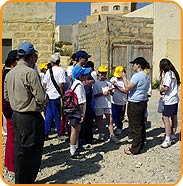EkoSkola Committee
The whole EkoSkola process is dependent on the setting up of a committee whose main responsibilities would be that of:
- Developing, implementing and monitoring a school environmental policy that addresses the environmental concerns of the school community.
- Ensuring that the interests of all the sectors of the school community are represented in the decision making process.
- Establishing adequate communication links with the whole school community ensuring wide ownership of the programme.
- Integrating the programme within the School Development Plan and the Local community.
The composition of the committee is up to each individual school.
A typical committee could be made up of:

- Member of the school management teamschool governor
- Teacher/s
- Pupils (this is an essential feature)
- Member of the school maintenance team
- Non-teaching staff member
- Parent
- Representative of the local council
There is no one particular way how the committee is set up. It might evolve from a group that is already active in the school, such as a Green Club, or a Students’ Council or a School Council. Or it can be set up from scratch through nominations from the head of school or the pupils.
The school determines the number of committee members, but it is suggested that it is not too large. Other persons may be co-opted onto the committee if needed to perform particular jobs. Pupils must be adequately represented in the committee and ideally they should be selected from their peers after the prospective candidates explain why they are volunteering to be on the committee preferably during a school assembly. Celebrating the setting up of the EkoSkola committee during a school function is a good way of generating interest of the school community in the programme. During such an activity the head of school might distribute certificates of membership.
Committee meetings should be organised at least twice a term, however, one would expect that during the initial stages of the programme, the meetings would be more frequent. Minutes of the meetings should be kept and communicated (on a notice board, or a newsletter, or website, or any other way) to the rest of the school community (including the School Council/Board of Governors) and preferably to the local community. It is expected that pupils take up responsibility (assisted by adult members of the committee) for certain management aspects of the committee meetings (e.g. minute taking and communication).



